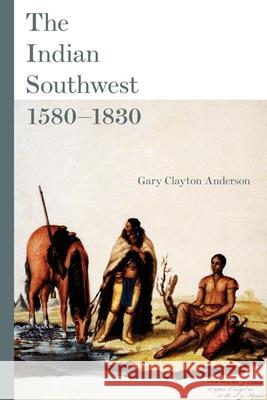The Indian Southwest, 1580-1830: Ethnogenesis and Reinvention Volume 232 » książka
The Indian Southwest, 1580-1830: Ethnogenesis and Reinvention Volume 232
ISBN-13: 9780806140674 / Angielski / Miękka / 2009 / 384 str.
Volume 232 in the Civilization of the American Indian Series In The Indian Southwest, 1580-1830, Gary Clayton Anderson argues that, in the face of European conquest and severe droughts that reduced their food sources, Indians in the Southwest proved remarkably adaptable and dynamic. Groups such as the Jumanos and Coahuiltecans, decimated by warfare, Spanish slave-raiding, and disease, either temporarily joined Spanish missions or assimilated into other tribes. Others, including the Caddos and Wichitas, survived the Spanish onslaught by remaining on its fringe, migrating in order to survive and expanding their involvement with other tribes. Yet others, such as the Comanches and Apaches, incorporated remnant bands and individuals, experienced population increases, and developed stronger economic systems. By 1780, when Spanish settlements on the southern plains faced economic stagnation, Indian tribes who had forged new alliances and trade networks enjoyed a thriving exchange-based political economy.
Volume 232 in the Civilization of the American Indian Series In The Indian Southwest, 1580-1830, Gary Clayton Anderson argues that, in the face of European conquest and severe droughts that reduced their food sources, Indians in the Southwest proved remarkably adaptable and dynamic.Groups such as the Jumanos and Coahuiltecans, decimated by warfare, Spanish slave-raiding, and disease, either temporarily joined Spanish missions or assimilated into other tribes. Others, including the Caddos and Wichitas, survived the Spanish onslaught by remaining on its fringe, migrating in order to survive and expanding their involvement with other tribes. Yet others, such as the Comanches and Apaches, incorporated remnant bands and individuals, experienced population increases, and developed stronger economic systems. By 1780, when Spanish settlements on the southern plains faced economic stagnation, Indian tribes who had forged new alliances and trade networks enjoyed a thriving exchange-based political economy.











